The best DNA testing kit
AncestryDNA does the best job presenting data in a clear, easy-to-understand way.

By Amadou Diallo
This post was done in partnership with Wirecutter. When readers choose to buy Wirecutter's independently chosen editorial picks, Wirecutter and Engadget may earn affiliate commission. Read the full guide to DNA testing kits.
Consumer-oriented DNA testing services come with inherent privacy risks and are bound by few legal guidelines regulating the use of your data. The ramifications of sharing your DNA with for-profit companies are continuously evolving. Opting into a recreational DNA test today will likely have future consequences that no one has even considered yet. If you're comfortable with that, we think AncestryDNA is the most effective service for people who want to learn more about their ethnic roots or find contemporary relatives. We've come to this conclusion after more than 80 hours of research and two-plus years of reporting that included evaluating the results from a test panel representing every major population group.
The aptly named AncestryDNA test stood out as the best ancestry DNA test because it presented the test results in a clearer manner than other services and placed the information in a useful historical context. Since all the DNA services we tested provided broadly similar results for the ethnic origins of our panel of testers, AncestryDNA's better reports and interface gave it a clear advantage. Plus, for people seeking distant cousins or even biological parents, the company's claimed DNA database of 10 million customers—twice the size of its closest competitors—increases the odds of successful matches. Unlike the other services we tested, however, AncestryDNA cannot track your maternal and paternal heritage independently or trace your ancient migration path out of Africa.
23andMe offers the same type of ethnicity estimates (and privacy risks) as AncestryDNA at a similar price. With a DNA database of 5 million users, it may offer smaller odds of connecting with unknown relatives, but it does have the most polished site design, which makes navigating the myriad charts, reports, and explanatory documents easier than on competitors' sites. For male testers, 23andMe can provide a look at the ancient migration paths of both maternal and paternal lines independently. And while we don't cover biomedical testing in this guide, 23andMe does offer its customers a suite of reports on potential health indicators as a paid add-on service.
FamilyTreeDNA offered broadly similar ethnicity estimates for our testing panel as AncestryDNA and 23andMe. Those concerned about privacy should know that it is the only service we're aware of that is voluntarily providing customer data access to law enforcement. FamilyTreeDNA does, however, provide the most comprehensive suite of testing options, offered as add-ons to the basic ethnicity test, than any service we evaluated. These additional tools should satisfy nearly any genealogy buff looking to explore their connections to early human migration or find relatives from one particular side of their family tree. The company's à la carte approach can quickly add up though. You can easily spend more than three times the testing cost of AncestryDNA or 23andMe.
Why you should trust us
I've written for Wirecutter since 2013 and have reported stories for The New York Times (now the parent company of Wirecutter), the PBS NewsHour, Politico, and The Atlantic. In researching this guide I spoke with experts in the fields of genetics, anthropology, and medical ethics from the National Institutes of Health, Stanford Law School, and the NYU School of Medicine, as well as genealogists who've provided commentary for television newsmagazines like Nightline and 20/20. To compare real-world DNA test results I recruited a panel of DNA test takers that collectively represent each of the seven major population groups identified by the companies we evaluated.
Who this is for
For this guide to the best DNA testing kits, we focused exclusively on services offering ancestral DNA testing: tests that comb through your DNA to help find where in the world you came from, unknown contemporary relatives, or both. But the scope of DNA analysis extends far beyond genealogy, with consequences for everything from medical diagnosis to law enforcement investigations.
Using any DNA testing service involves data and privacy risks. Before deciding which of our picks is best for your needs, we urge you to spend a few moments reading our privacy section. We recommend these tests only for people who have taken the time to gain a clear understanding of how their data will be stored, shared, and protected. Privacy policies can vary widely, from multipage PDF documents to a couple of sentences on a website. Making a well-informed decision means that you're actually going to have to read them.

Even if you're comfortable with the privacy risks, setting realistic expectations is crucial. The marketing hype around these tests suggests a level of certainty that the underlying science simply cannot provide.
The accuracy of DNA test results varies depending on how much detail you're looking for. "The continental predictions ... European versus African versus Asian are pretty solid," said CeCe Moore, a genealogist who has worked as a consultant and producer on the PBS Television series Finding Your Roots with Henry Louis Gates, Jr. "If you test at the top companies you should expect that those numbers will all be pretty close. When you get down to country-level labels, however, it's very difficult to separate those out. You can't look at the results and say with any confidence that you're exactly 34 percent Scandinavian, for instance. You just can't."
For one thing, human history is messy. It's full of mass migrations of people and a resulting mixture of previously geographically separated ethnicities. And if you tend to associate ethnicity with country designations, keep in mind that national borders are an extremely recent occurrence in the span of human history. Further complicating matters is that your results from any DNA service are based on probability or likelihood, with most of the big companies relying on algorithms to assign estimates of your ancestry percentages.
For Jonathan Marks, anthropology professor at the University of North Carolina at Charlotte, the big unknown for customers is the margin for error with these estimates. "If [a service] tells me I'm 95 percent Ashkenazi Jewish and 5 percent Korean," he asked, "is that really different from 100 percent Ashkenazi Jewish and zero percent Korean? It's all privatized science, and the algorithms are not generally available for peer review. That's why their ads always specify that this is for recreational purposes only ... lawyer-speak for, 'These results have no scientific standing.'"
If you're taking on the challenge of building a detailed family tree, a DNA test can provide useful information about your ancestry. It is, however, just one tool in the genealogy tool belt and is far from the final word in establishing family connections. "DNA works hand-in-hand with paper trail documentation," said Judy Russell, genealogy lecturer, educator, and author of the blog The Legal Genealogist. "It's something you do with, not instead of, regular [genealogy] research. Except in very close relationships, DNA alone can't provide the answer. It can tell you you're related to someone, but DNA can't distinguish between a first cousin, a half aunt or half uncle or a great-grandparent."
All of the genealogy experts we talked to stressed that unearthing family history takes a lot of work. And though DNA is a powerful tool, it is just as likely to raise questions as to answer them, and to begin to answer those you'll need to turn to family documents, public records, and interviews. And you may not be comfortable with what you find. Moore added that anyone considering using a DNA service must be prepared for unexpected and sometimes unsettling results because though DNA can identify kin, it can also tell you who you're not related to. "We see it every single day," she said. "Sometimes—as with adoptions for instance—our paper trail does not represent our true genetic heritage."
In the course of testing for this guide, one of our participants learned that a parent was fathered by someone other than the person they grew up knowing as their grandfather, unearthing a family secret and placing a heavy and unwanted burden on our tester's shoulders.
A DNA test can't tell you everything about race and ethnicity
As a society we make fundamental decisions based on notions of ethnicity and race. The fact remains, however, that 99.9 percent of our genetic makeup is identical for all humans. And of the remaining 0.1 percent that actually is different, around 85 percent of those distinctions are unrelated to characteristics that we relate to ethnicity or race. So when you submit a DNA sample to trace your ethnicity, you should keep in mind that we're dealing with a really small amount of genes that could possibly be different between human beings—0.015 percent, to be exact. And that's not even the biggest challenge, said Dr. Lawrence Brody, director of the Division of Genomics and Society at the National Institutes of Health. "There's no single gene variant that makes you Tunisian; almost any variant that you'll find in Tunisia you'll also find in Argentina," he noted. DNA tests simply look at how often these variations occur. "Let's say there are 27 variants I find in Tunisia which occur in 1 percent of Tunisians," Brody explained, "but those same variants are found in 50 percent of Argentines. If a DNA test shows I have 17 of those variants, it's more likely that I'm an Argentine than a Tunisian." This, Brody said, is how companies build their mathematical algorithms; they use the probability that people with certain gene variants—mutations in the DNA sequence—tend to be from one part of the world versus another.
Brody noted that for scientists, ethnicity and race are problematic terms because DNA simply points to biological ancestry. DNA can place you on a given branch—or branches—of the human family tree but doesn't give a precise picture of the time period our ancestors spent living in a particular geographic area, which is how we commonly define our heritage. "This is an issue we've been struggling with since the genome was sequenced. Race and ethnicity are really complicated issues and in some ways are outside of the genome," he said, pointing out that DNA analysis can give us insights into ancestry from 10,000 years ago, but most folks are looking for more recent connections like their great-great-grandparents. "You could have known relatives from Germany and a DNA test could say you're from India," Brody added. "These are not mutually exclusive because your people could have migrated from India to Germany thousands of years before you're aware."
Key terms in DNA testing
Haplogroup: A genetic population sharing a common ancestor. You can think of each haplogroup as a separate branch of the human family tree. We all started out as one haplogroup in Africa. But then as we left, we scattered, people reproduced within these separated groups, and our DNA slowly mutated and the number of haplogroups expanded. Four of the largest haplogroups cover people of European, African, Native American, and Asian descent. Many more subgroupings are still being defined today; to keep them straight scientists identify major haplogroups by a capital letter and give sub-haplogroups numbers and lowercase letters. For example, R1b is the common sub-haplogroup for people with Western European heritage.
Autosomal DNA: This is what we typically think of when we think about DNA—the stuff that makes up 22 of your 23 pairs of chromosomes. This is the genetic inheritance you get from both your mother and your father, combined (the technical term is recombined) to make you. Autosomal DNA testing can tell you about your ethnicity and find matches to living relatives within the past five generations. This is useful because it can tell you about the ancestry on both sides of your family, as opposed to the next two common types of testing.
Mitochondrial DNA: Often abbreviated to mtDNA or mDNA, this is the DNA inherited solely from your mother's side, because it's passed down to you from the mitochondria (tiny structures with their own chromosomes that provide energy to your cells) in your mother's egg cell. This kind of testing can tell you about ancient migration routes of ancestors from thousands of years ago on your mother's side and also about your haplogroup. The interesting thing about mitochondrial DNA is that unlike autosomal DNA, it isn't recombinant—it doesn't mix with your dad's, and so yours is exactly like your mother's. Because it's an exact match, scientists can trace mitochondrial DNA relatively easily from place to place.
Y-chromosome DNA: Usually called Y-DNA for short, this is the DNA that makes up one half of your 23rd, or sex, chromosome—the DNA inherited (if you are biologically male) solely from your father's side of the family. Biological women have two X chromosomes: XX. Biological males have XY. Y-DNA testing can give you information about your haplogroup and the ancient migration routes of ancestors from your father's side of the family. But the obvious limitation is that only biological males can give samples for a Y-DNA test.
Reference population: This is a data set of individuals of known geographical origin that companies compare your DNA sample with to determine your ethnic makeup. These population samples can be a combination of both publicly available research and proprietary data that companies have acquired from their own customers. Though companies strive for reference populations that are as inclusive as possible, individuals of European ancestry usually comprise the vast majority of these data sets—we've seen as high as 65 percent—compared with other ethnic populations.
How we picked the best DNA test kit
A Google Shopping search for "DNA test kit" returns more than 200 results, revealing companies offering services ranging from paternity resolution to canine breeding. For this guide we limited our research to companies devoted in large part to human ancestry DNA testing. We are not covering biomedical DNA analysis that can indicate risk for hereditary diseases. In the spring of 2017, the FDA gave 23andMe, one of the most popular DNA services, the go-ahead to resume testing for genetic health risks—the agency ordered the company to halt such tests pending its review of the tests' safety and accuracy. Biomedical data that conveys your individual risk for diseases like Alzheimer's or Parkinson's is obviously much more sensitive and potentially difficult to understand the implications of without working with a doctor—and much more valuable to third parties—than results about where your ancestors might have come from. The privacy and psychological factors to consider before purchasing these types of analysis are significant and fall well beyond the scope of this guide.
We identified 15 US-based services offering ancestry DNA testing. Because the major companies now offer DNA testing for as little as $100, we eliminated prohibitively expensive options like Full Genomes, whose least expensive test starts at $545, and opted instead for companies with prices that max out at half that. We further limited our contenders to those with
large databases of existing customer DNA. The experts we consulted told us that though DNA testing techniques are well-established and will be similar no matter what firm you choose, the relative sizes of the reference samples that your DNA is matched against for estimating ethnicity and/or finding relatives is one of the big variables among ancestry testing services. The larger and more diverse the sample size, the greater the likelihood that you'll receive informative results. This narrowed our list of contenders down to just five companies; 23andMe, AncestryDNA, FamilyTreeDNA, National Geographic Geno DNA, and African Ancestry. For more information about what we dismissed and why, see the Competition section.
Privacy concerns with DNA testing
Few of the choices you'll ever make as a shopper are as fraught with as many unknowns around data security and privacy than submitting a saliva sample to a for-profit company for DNA analysis. Not only is the information inherently personal, but the very nature of digitally accessible data makes it impossible to guarantee who will and won't be able to see and use it, now or in the future.
Since we began research for this guide in 2017, one testing service has signed a multimillion-dollar deal with a pharmaceutical company for access to customer DNA. Another has divulged that it has been providing access to law enforcement, even without a legal order.
Even if you're only paying for an ancestry test, it's likely that many of these companies are analyzing biomedical markers in your DNA as well, raising further questions about just what it is you're sharing with an industry that is under little federal oversight or regulation. And it's becoming more and more evident that your choices about what information to share may not only affect you, but may have implications for your relatives, no matter how distant.
In early 2018, California law enforcement officials solved a murder case by uploading a suspect's data to a hobbyist DNA database, ultimately identifying him through relatives with matching DNA. In Canada, immigration officials are now using DNA samples and consumer ancestry websites to try to establish the nationality of migrants. FamilyTreeDNA recently acknowledged it has been working voluntarily with federal law enforcement in criminal investigations, allowing agents to upload crime scene DNA to look for familial matches among the company's customers. In 2019, the Ninth Judicial Circuit Court of Florida issued a warrant to allow a detective to override user privacy settings and search its full GEDmatch database, the first instance we know of law enforcement obtaining a court order to do so and may lead warrant requests for other services. (We have not evaluated GEDmatch as a possible pick because its database is too small.) And 23andMe made news when it announced a $300 million deal in 2018 to provide pharma giant GlaxoSmithKline access to its customers' genetic data.
"We're in an environment in which we don't have rules about big databases, who accesses them and under what circumstances," said Arthur L. Caplan, director of the Division of Medical Ethics at New York University's School of Medicine. There are no comprehensive federal laws or guidelines stipulating what a direct-to-consumer genetic testing company can or cannot do with your DNA data. Unlike a doctor or HMO, the vast majority of these companies are not subject to the HIPAA laws governing the privacy of your health and medical records.
Your protections extend only as far as a company's privacy policy and any consent form you agree to. You are in the position of having to trust these companies to challenge law enforcement requests before handing over your information. And the legal recourse you'd have should a company (or another customer) violate those policies is unclear. Caplan argues that it is unnecessarily difficult for people to make a well-informed choice. "Consumers need to be told [of potential risks]," he said. "But in a way they can understand. Just doing a 'truth dump,' which is what they do when they give you a 20-page consent form, is not enough. The goal of these disclosures should be comprehension, not legal protection for the company."
There are no comprehensive federal laws or guidelines stipulating what a direct-to-consumer genetic testing company can or cannot do with your DNA data.
Because the industry is largely self-regulated with respect to privacy, companies' stated commitments to safeguarding your data as well as seeking consent before sharing your information with third parties range broadly. "We see everything from a comprehensive 100-page policy from a big company ... to a mom-and-pop shop whose privacy policy might be a sentence long," said James Hazel, a Vanderbilt University Medical Center fellow who co-authored a survey of privacy policies at 90 US genetic testing companies.
In July 2018, many of the largest DNA testing services, including 23andMe and AncestryDNA, agreed to adopt a voluntary "best practices" standard of consumer privacy developed by the Future of Privacy Forum (FPF), a nonprofit think tank that receives corporate support from a who's who of tech companies. Hazel called the standards, "a positive development ... that starts the conversation and highlights some of the privacy issues." He pointed out, however, that the restrictions laid out in best practices documents do not apply to any customer data that has been de-identified. "There are circumstances where de-identified data can still be traced back to an individual," he said. So he'd like to see clarity on what additional steps companies are taking, such as aggregating data, essentially anonymizing the data of large groups of customers in one go, making it more difficult for a third party to trace data back to an individual.
And we emphasize that adherence to these standards is voluntary, with no regulatory recourse for violations. FamilyTreeDNA, in fact, was also listed on the FPF website as an adoptee when the best practices were announced. But in January 2019, after it was revealed that the company was voluntarily sharing database access with federal law enforcement agents, the FPF removed FamilyTree DNA as a supporter of the initiative, saying the arrangement, "conflicts with FPF's Best Practices."
When we first reviewed these services in 2017, we commissioned a legal analysis of the terms of service and privacy policies of AncestryDNA and FamilyTreeDNA by Brian J. McGinnis, a partner with Barnes & Thornburg LLP and a founder of the firm's data security and privacy practice group.
McGinnis found the policies to be in line with common industry practices. "They've made an effort to disclose what they're doing, with a lot of standardized language you see across different services in the tech industry," he said. And companies do seem to be responsive to requests for more transparency. In 2017, McGinnis saw room for improvement, noting that AncestryDNA's DNA-specific terms of service and privacy policies were not presented in as clear a manner as the company's general privacy statement. As of this writing, the documents have been streamlined with more user-friendly language, and DNA-related policies are now incorporated into an updated terms of service document and a revised general privacy statement.
In light of news stories highlighting privacy concerns that emerged since the publication of our original guide, we asked Ancestry.com, provider of our top pick, to update us on its data sharing and privacy stance. A company spokesperson told us that as of August 2018, "Ancestry is not currently providing any individual-level genetic data to third-party researchers," instead providing "summary-level data" in its current collaboration with the University of Utah. In addition, the spokesperson said, "We commit to not sell DNA data to insurers, employers, or third-party marketers without our customers' explicit consent."
FamilyTreeDNA CEO Bennett Greenspan confirmed to us via email that the company's Y-DNA and mtDNA tests do not return any biomedically relevant data, saying, "We don't want anyone to get into something beyond their comfort zone."
We strongly encourage you to read the privacy statement of any DNA testing service before purchasing a kit. It's not uncommon for companies to share aggregated genetic information for either marketing purposes or sale to third parties. And many present you with an opt-in choice to share your genetic information with outside research projects. This isn't the time to blindly click on a consent box like you do with app updates.
Here are some questions you should make sure are answered before submitting a DNA sample:
Who is doing the DNA testing? If a company is using an outside lab to sequence your DNA (most do), you'll want to read the privacy statement of the testing facility as well.
How long are my physical samples (saliva and DNA) stored? Some companies destroy them once they complete their analysis. Others may store them for a year or even indefinitely.
Can I delete my genetic information and analysis from a company's website? Some—but not all—companies offer this option via an email request. Again, if they used an outside lab to perform the sequencing you'll need to make a separate request to the testing company as well.
Can I adjust my privacy settings? Some companies offer a family-matching service. This is usually an opt-in program where customers are notified of DNA matches in the customer database and provided with self-reported detail and contact information of their matches. Most services will allow you to opt out of the program if you later change your mind.
How we tested DNA kits
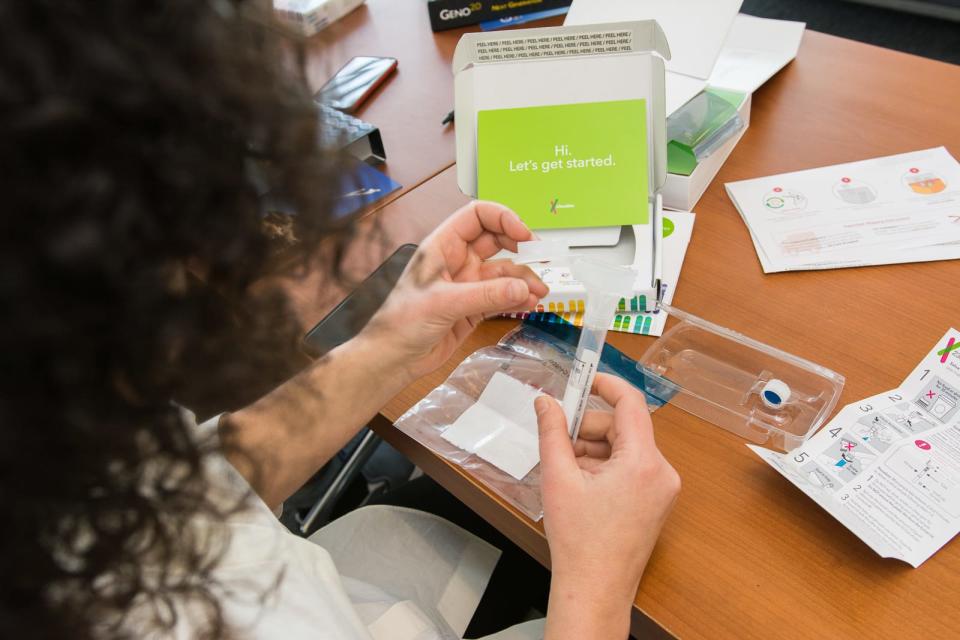
We knew from talking to experts that the customer databases that companies use to determine your ancestral roots can vary widely in their representation of ethnicity, with European-descended populations overrepresented by a large margin. This means that people with ancestry from anywhere else in the world are less likely to get detailed (or even useful) results from their testing. To see how this bias plays out in actual results we recruited a panel of testers (three men and four women) who, among them, have known ancestry from Africa, East Asia, Europe, the Middle East, (native) North America, Polynesia, and South Asia. Because of the sensitivity involved with DNA test results, in this guide we are withholding the names of our test participants.
In early spring 2017 the seven participants convened at our offices in The New York Times building, where they registered their kits online and provided DNA samples either by swabbing the inside of their cheeks or spitting into a tube. To further evaluate the role that sample size plays in ancestry results, we had our tester of African descent, a biracial teenager with an African-American father and a South Asian mother, submit a sample to African Ancestry, whose promotional materials claim access to the world's largest database of contemporary African DNA.
Prices vary by company and range from about $100 on the low end for AncestryDNA and 23andMe to as much as $360 for FamilyTreeDNA if you opt for the company's high-resolution Y-DNA tests. All companies add shipping charges (of between $7 and $12 at the time of this writing), which cover prepaid mailers to send in your samples.
After shipping a total of 29 kits containing our testers' physical DNA samples back to each company, our wait times for results ranged from three to eight weeks.
Once results were available we asked each tester to complete a survey comparing how companies conveyed basic ancestry information and how easy or difficult it was to navigate to more detailed analyses of results.
The best DNA testing kit: AncestryDNA
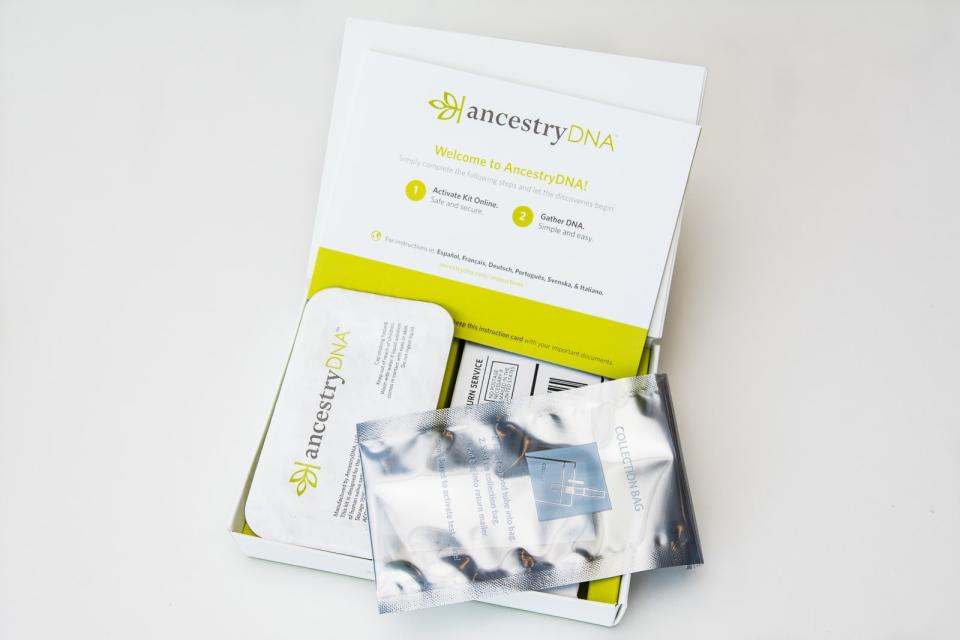
AncestryDNA is the service we recommend for most people who want to learn about their ethnic heritage and/or connect with unknown relatives. It's also one of the most affordable services we evaluated, and our testers ranked it among the top in offering useful information in an clear presentation. The company also has the largest reported database of DNA customers we've seen, providing significantly higher odds of a successful search for contemporary relatives than its competitors.
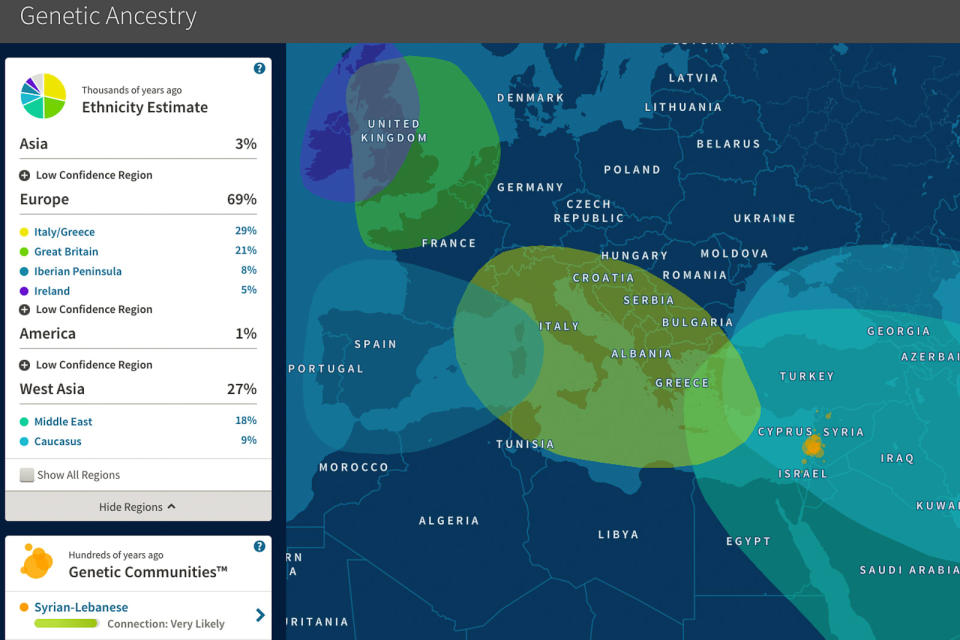
All companies have access to public ancestry data sets like the Human Genome Diversity Project and International HapMap Project. AncestryDNA, like all of the services we tested, also relies on DNA samples from its own customers who've consented to participate in such research. The upshot is that each company has its own mix of DNA reference samples to draw from, explaining why you'll get slightly different ethnicity percentages from different companies. AncestryDNA's V2 reference panel contains 3,000 individual DNA samples meant to represent 26 distinct geographic regions.
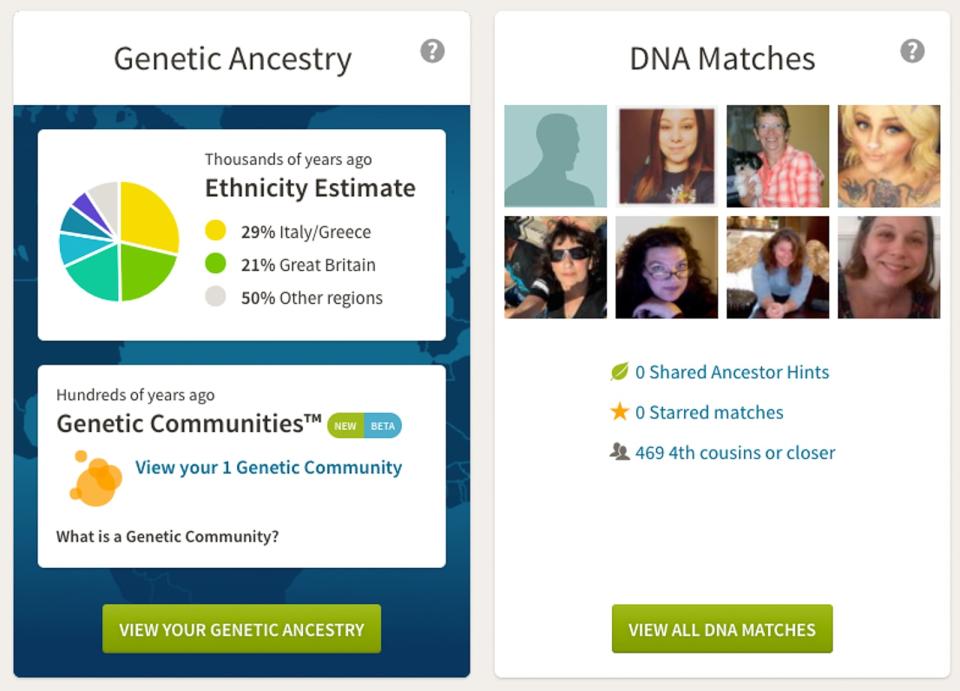
Beginning the testing process is easy. Inside the packaging, clearly marked instructions prompt you to register your DNA kit on the company's website, create a customer account, sign off on the terms of service agreement, and choose if you want to grant consent for your results to be used anonymously in research projects by AncestryDNA or in collaboration with third parties.
The next step is to collect your DNA sample by filling the provided tube with saliva. The directions state that you must refrain from eating, drinking, smoking, or chewing gum for at least 30 minutes prior to collecting your sample.
Both the registration and the DNA collection process are straightforward and well-documented. The whole thing takes about 10 to 15 minutes. A small USPS prepaid shipping box is provided for you to send your sample to the testing lab.
Our panel of testers shipped their samples from New York, California, and Texas. The earliest results were available in nine days, and the longest took four weeks. Based on feedback we've seen in customer message boards, wait times are likely to vary depending on the current level of demand but the six-to-eight-week time frame that AncestryDNA gives on its website seems to be a reasonably accurate estimate.
Once results are ready you'll receive an email with a link to your user page. From there, a single click takes you to an overview of your ethnicity estimates as well as potential relatives the site has flagged among its customer base due to the similarity of your DNA makeup. Until you join AncestryDNA's subscription service, the information you can glean from these family matches is limited. You can see their username and profile picture and they can see yours.
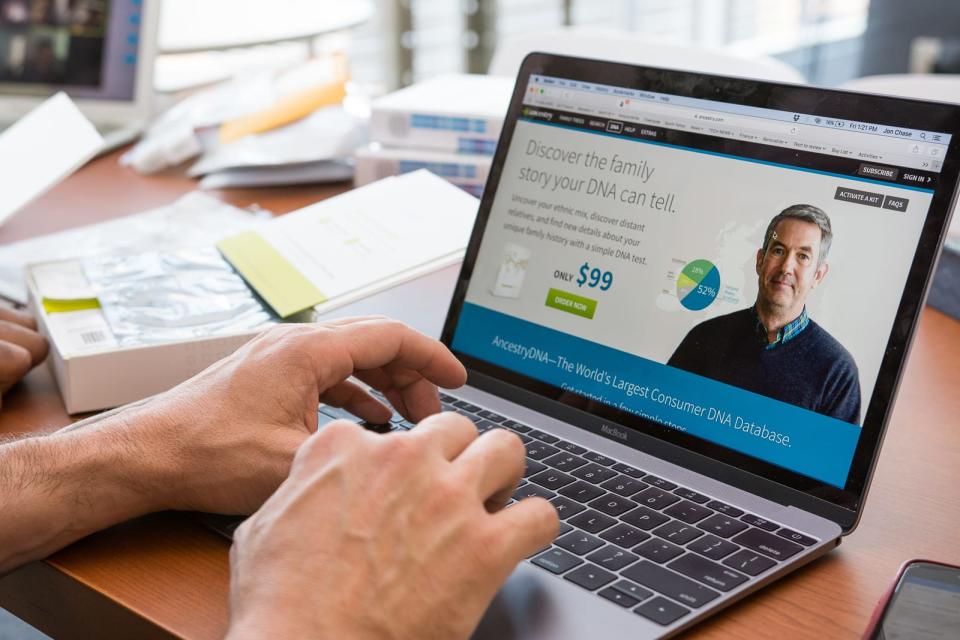
Your ethnicity information is presented as a pie chart, showing estimates of "where your ancestors came from hundreds or thousands of years ago," the site explains, noting that as analysis improves and reference databases grow over time, your estimated mix of ethnicities may change. It's crucial to understand that these ethnicity percentage estimates are not definitive answers, but probabilities with built-in wiggle room. It's no accident that AncestryDNA refers to its algorithmic process as "ethnicity prediction."
To get a clearer sense of what the numbers mean you can click on any subregion to get a more detailed view of your ethnicity estimate.
The screenshot below is from one of our testers whose known ancestry (based on family records) includes British and Greek heritage, information that is supported by her DNA results. Her ethnic ties to Ireland are listed at 5 percent, yet the range slider indicates that her genetic ties to this region (on AncestryDNA this includes Wales and Scotland) could actually be anywhere from zero to 16 percent—she shares DNA associated with people from these geographical regions, but as we've discussed above, given the history of human migration, people who've ended up elsewhere share many of those same markers too. So for our tester to use these results to claim with certainty an Irish heritage of exactly 5 percent would be misleading.
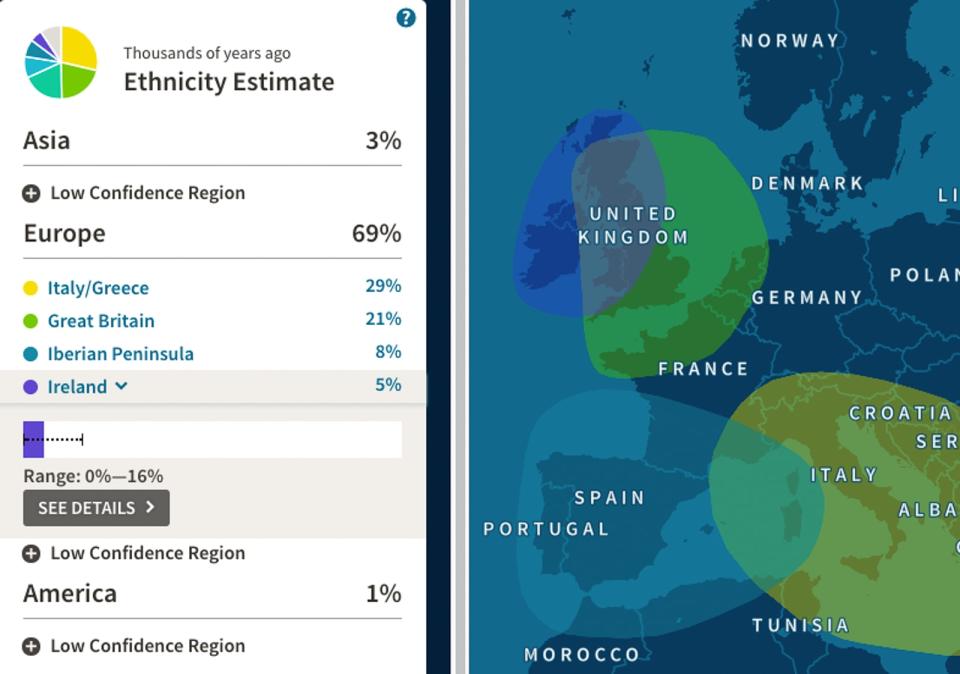
This example is not an indictment of AncestryDNA. All testing companies face the same dilemma; customers want to know their precise ancestral makeup, but the science can provide only educated estimates. What we like about AncestryDNA is that it provides a straightforward means of putting your genetic information into context. Clicking on the See Details box (below the range slider in the screenshot above) takes you to a historical overview of the region and a Genetic Diversity page that explains the link between your results and those of natives of that region. In the case of our tester, this reveals the tenuous links between their results and those of a typical person of known Irish heritage.
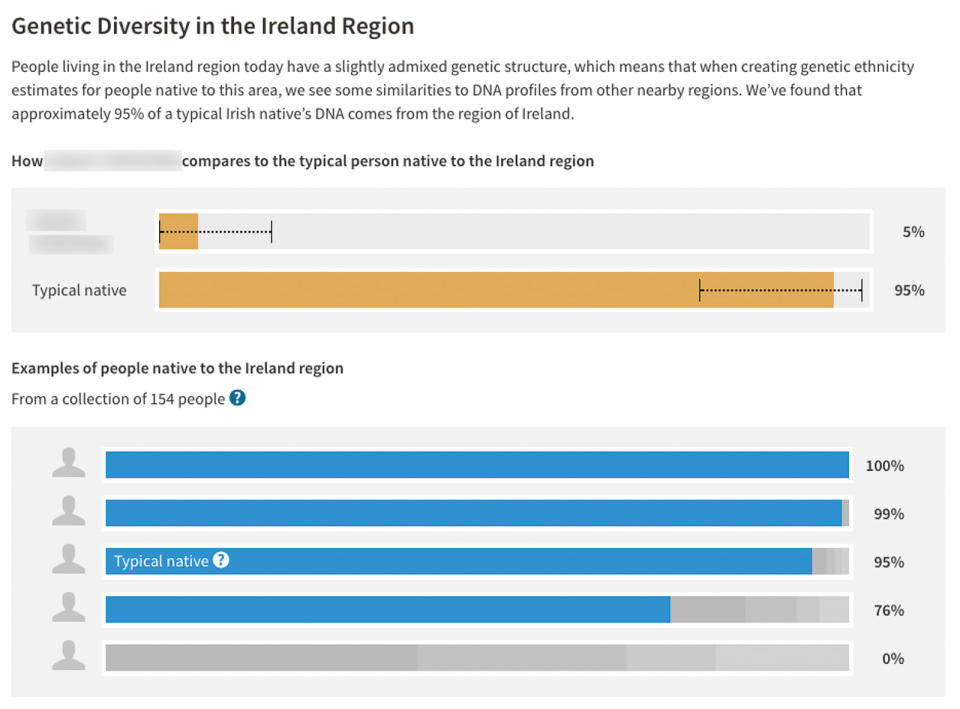
As you can see in the above screenshot, AncestryDNA estimates that 5 percent of our tester's DNA comes from the Ireland region. A "typical native"—described by AncestryDNA as a person in their DNA database whose ancestors have lived in that region for centuries—has a median "ethnicity estimate" of 95 percent. This means that half of the 154 people linked to Ireland in the reference database—people with documented family ties going back several generations—have more than 95 percent ethnicity that's native to this region and half of them have less than 95 percent ethnicity native to the region. Given this context, though it's statistically possible for our tester to have roots from this region, it's certainly not something she can claim with any certainty unless supported by family documents or historical records.
This is the reality of DNA ancestry testing when it comes to ethnicity. No matter which company you test with, you've got to dig into the data on the website at least a little bit to truly understand your results. And once you do, the picture often becomes less precise than you may have originally assumed. AncestryDNA makes accessing additional detail and context more intuitive than most of its rivals do. Additional information is usually just a click away, easily identified by well-designed icons with plainly worded text.
AncestryDNA also automatically builds what it calls Genetic Communities—collections of its customers who share some DNA—that can identify migration routes that have occurred within very recent generations. AncestryDNA was the first company we saw to offer this type of information and, combined with the company's large customer database, it can be valuable to history buffs who want to know how both close and distant relatives ended up in their contemporary locations.
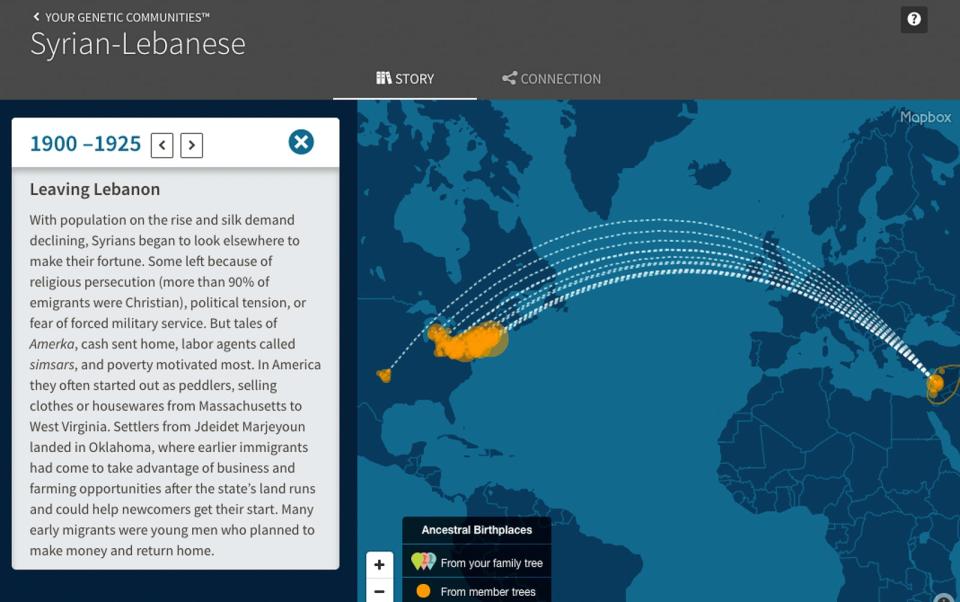
Dr. Julie Granka, who is AncestryDNA's manager of personalized genomics, explained to us that the company begins by identifying clusters of customers in its database with similar ancestral DNA. Through the process of analyzing historical records like customer-provided family trees and other paper-trail documentation relevant to this collection of individuals, the company is able to piece together the geographical movements of that community over time. This genealogical crowdsourcing combines the science of DNA with historical context to give a fuller picture of your family history.
If you're using a DNA test to try to find unknown relatives or biological parents, the biggest advantage to choosing Ancestry is that the company claims a DNA database of 10 million customers as of this writing; that's twice the size of its closest competitors. Though you're not guaranteed to find a match, access to such a large database increases the odds of finding unknown cousins or biological parents.
The company's DNA-matching feature automatically compares your DNA with that of its entire customer database, alerting you to any genetic matches alongside an estimate of how closely you may be related. Among our panel of seven testers, three were notified of matches to either first or second cousins.
You can see the username and profile photo of your potential match (they can see yours as well), and using the site's messaging platform you can reach out to them. But access to personal contact information for your matches, their family trees, and the company's database of historical records requires you to purchase a subscription, an upgrade that over the course of a year is more expensive than the DNA test itself. The company does provide a two-week free trial, however, to help you decide if this data is worth the additional expense.
Flaws but not dealbreakers
AncestryDNA was the only service we tested that is limited to autosomal testing. It cannot track your maternal and paternal heritage independently, nor can it tell you about your ancient ancestors and their migration out of Africa. At one time the company provided Y-DNA and mitochondrial tests, but it dropped them in 2014 to focus exclusively on its ethnicity and family-matching services. We think that for most people getting started in researching their ancestry, these will be sufficient, but those wanting a more granular look at the past may want to look at 23andMe or FamilyTreeDNA.
Creating a customer account, a requirement when registering your DNA kit, means that any customer that the company deems a potential family match, no matter how distant, can see your username and profile photo (if you've uploaded one) and contact you through the company's Web-based messaging system. This has obvious benefits for people who are looking to expand their family tree. But if you simply want an ethnicity breakdown without the potential to discover unknown family connections, services like FamilyTreeDNA and 23andMe won't reveal any of your information to other customers until you opt in to their family-matching services.
To help refine its ethnicity results, AncestryDNA uses a DNA test chip that also contains some markers currently related to biomedical information, according to a 2016 company blog post. As of this writing the company hasn't announced plans to offer DNA health tests. But if you're not comfortable with a company having access to your potentially more sensitive biomedical DNA data, we'd recommend FamilyTreeDNA, which purposefully does not test for or analyze health-related DNA markers, its CEO told us via email.
Another great DNA test: 23andMe
While 23andMe has a DNA pool of more than 5 million customers, that's still about half of what AncestryDNA gives you access to, so you face potentially lower odds of finding genetic matches when searching for contemporary relatives. But if your primary interest lies in ethnicity estimates, both services provide similar results. On desktop browsers, 23andMe has the more polished user interface, with easier site navigation and a useful summary of your DNA analysis right on your homepage.
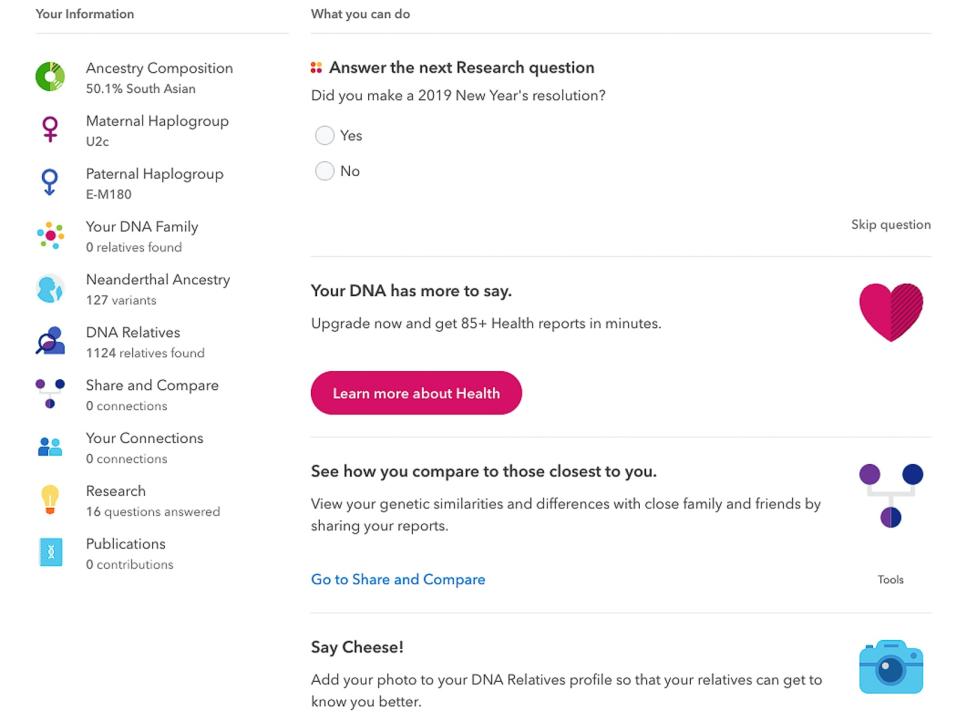
Although we don't examine it in this guide, part of 23andMe's appeal for some users is its biomedical analysis, available for an additional fee, to indicate potential risks for hereditary diseases. We'll have more to say on that in a moment, but you should be aware that the monetization of customer biomedical data has always been at the heart of the company's business model.
Collecting and sending saliva samples was straightforward, with clear instructions and sturdy mailers. All of our testers received their results in just under four weeks, which is about what we experienced with most of the competitors we evaluated.
Unlike at AncestryDNA, you can take full advantage of 23andMe's family-matching feature, including messaging users who share your DNA, without an additional charge. This is an opt-in feature, and should you decline to participate, the 23andMe users who have opted in will not see your username, profile photo, or contact info even if you turn up as a genetic match. At any time after opting in to the family-matching feature you can easily opt out in just a couple of clicks via a prominent preferences button.

The interface makes finding detailed information easy, with the most modern-looking site design of its competitors. Whether you're looking at ethnicity estimates, family matches, or haplogroup results, you'll see a tab leading to a more detailed analysis of the data, or at the very least a series of FAQs is always available near the top of the page. Through a partnership with Blurb, you can even have your collection of your DNA analysis compiled into a hardcover book for about $40. Based on the PDF preview, this tome relies heavily on graphics and some full-page stock photography to achieve its 50-page length. But it is attractive enough to be a coffee-table conversation starter and, again, is an optional purchase.
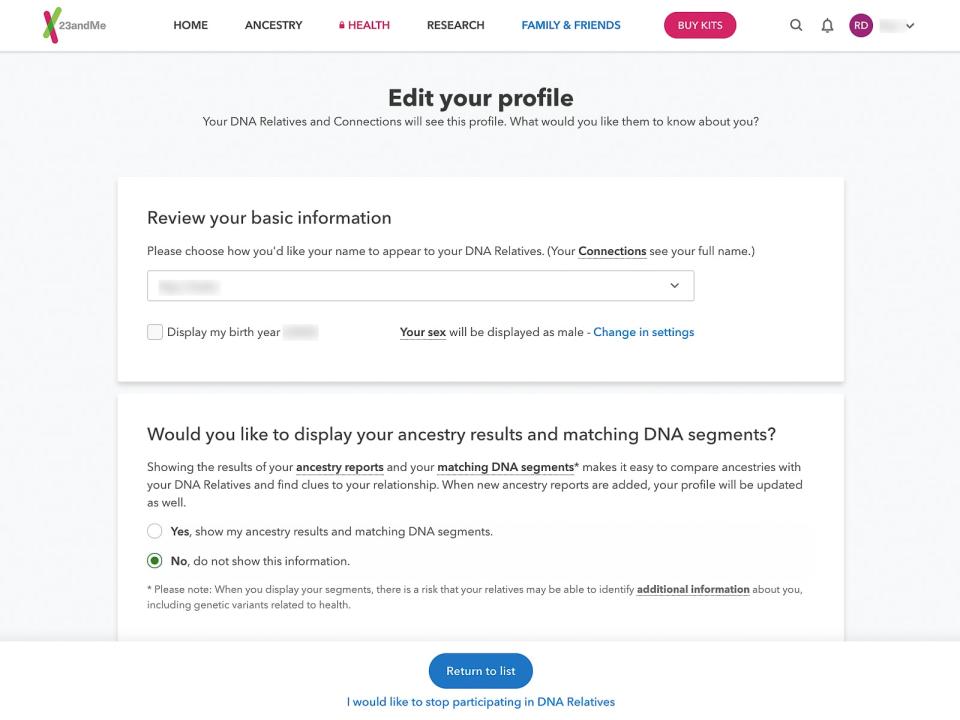
In earlier versions of this guide we resisted recommending 23andMe in part over concerns about its collection of your potentially more sensitive biomedical DNA data. We confirmed with the company by email that whether you purchase an ancestry-only test or the combined ancestry plus health package that can indicate a genetic propensity for certain hereditary diseases, the testing and analysis of your DNA is identical.
A test result indicating that you're at risk for Alzheimer's clearly has a different set of ramifications than one that says you're East Asian. Even if you purchase just the ancestry test (as we did for our testers) the lab still captures the raw data that is used for biomedical analysis. The company presents this as a convenience so that if you later decide to upgrade to its health test, you won't need to submit a new DNA sample or even wait for 23andMe to perform an analysis; that work has already been done.
Kate Black, at the time the company's privacy officer, assured us in an email that, "Regardless of the Service chosen by the customer, 23andMe will not perform additional testing, include an individual's information in 23andMe Research, or share it for research purposes without their voluntary, informed consent to do so."
The problem is that if you've paid for just the ancestry test and signed the consent form, you've granted access not just to your ancestry data but also to your biomedical data, which you'd have no reasonable way of knowing was even obtained. As we noted in the Flaws but not dealbreakers section, a similar situation exists with AncestryDNA.
Upgrade for data-savvy genealogists: FamilyTreeDNA
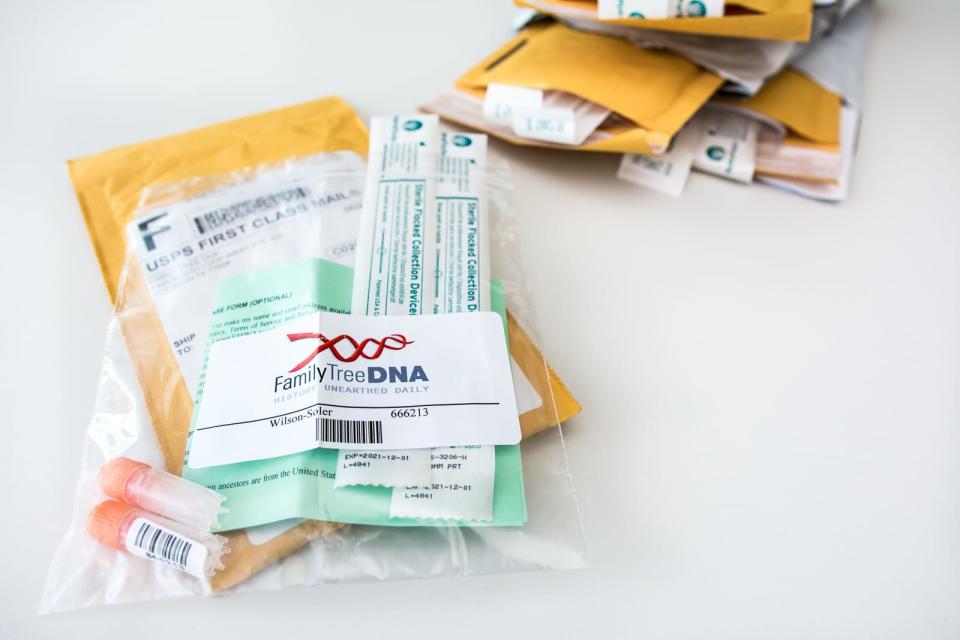
FamilyTreeDNA offers an affordably priced autosomal test, and it gave our panel of testers results that were broadly similar to those from AncestryDNA and 23andMe. But FamilyTreeDNA's services extend beyond just ethnicity estimates, with à la carte options for both Y-DNA and mitochondrial testing at various levels of precision. The costs can add up though. FamilyTreeDNA's most detailed tests can set you back more than three times what you'd spend on its strongest competition. But you get what you pay for, and if you're committed to unearthing family history and are familiar with terms like SNPs (pronounced "snips") and centiMorgans, you'll feel right at home within the company's community of genealogy-centric customers. The company claims a much smaller DNA database than AncestryDNA and 23andMe, but it still offers a reasonable chance of connecting with relatives.
Submitting your sample to FamilyTreeDNA is just as straightforward as with 23andMe and AncestryDNA, with the major difference being that you swab the inside of your cheeks for the FamilyTreeDNA test, rather than spitting into a tube as the other two companies require. Though the company's packaging is not as slickly branded as its rivals' and the prepaid return mailer was a bubble envelope rather than a cardboard box like AncestryDNA's, our DNA samples had no problems in transit. Our testers received their autosomal results within about four weeks, but results from the Y-DNA and mitochondrial tests we ordered took anywhere from an additional one to four weeks to become available.
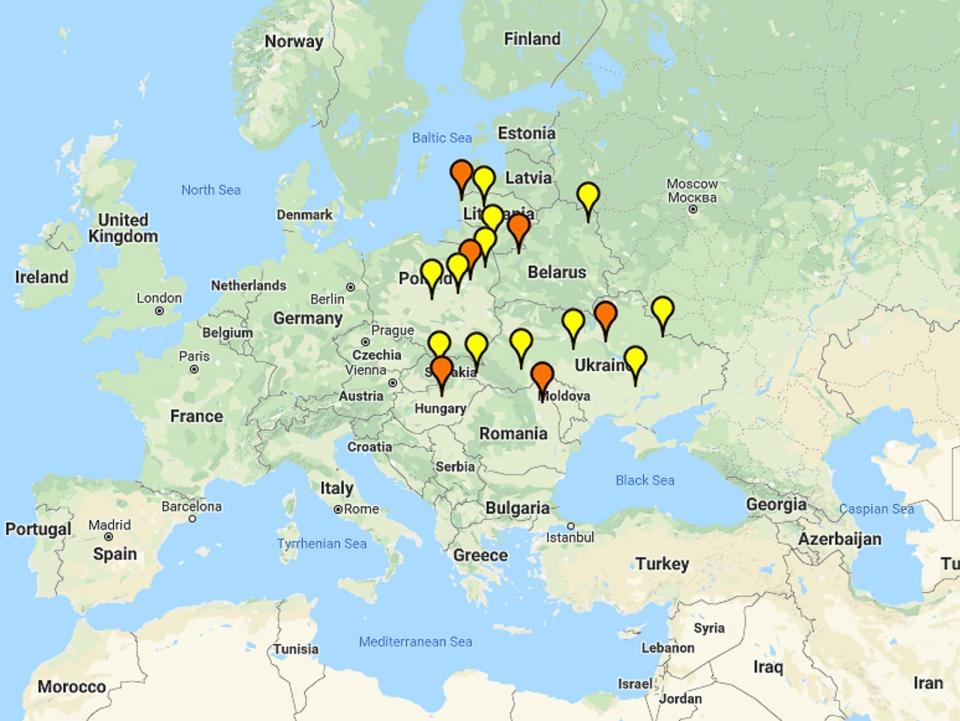
Like AncestryDNA and 23andMe, FamilyTreeDNA lets you opt in to a family-matching service to find and contact other customers who share your family DNA. Its customer database is more than six times smaller than AncestryDNA's at 1.7 million customers, CEO Bennett Greenspan told us. And unlike AncestryDNA, FamilyTreeDNA does not charge an additional fee to fully participate in its family-matching service. As is the case with 23andMe, you won't be able to see any information about your potential matches (nor will they see anything about you) until you opt in to the service.
FamilyTreeDNA provides separate family matches for each test you order. If you pay for both an autosomal and mitochondrial test, for example, you'll have access to two sets of matches. You'll see customers who share your autosomal DNA and could be related on either your mother or father's side going back five generations. You'll also see customers who share DNA from only your maternal side of the family going back many centuries, potentially resulting in a more complete picture from which to start building your family's genealogy.
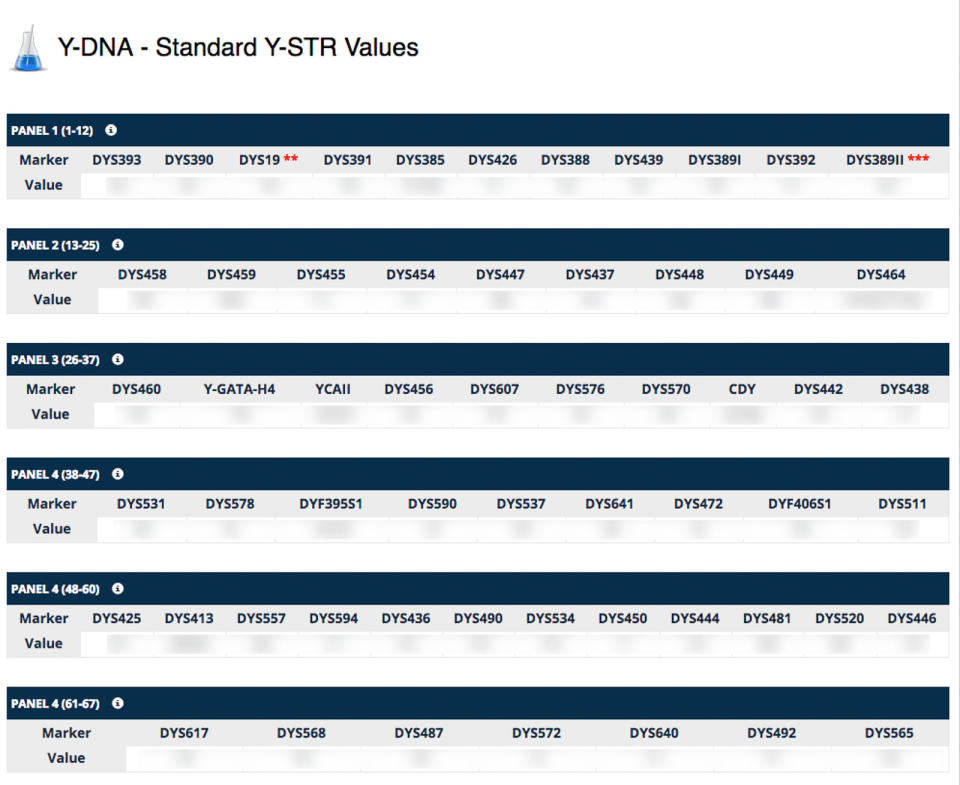
The sheer amount of information from Y-DNA and mitochondrial tests can be overwhelming and difficult to put into context for people who are new to genealogy. As one of our testers put it, "FamilyTreeDNA had the most complete info ... even if you can't really understand some of it."
The site does offer a collection of user guides and online handbooks that cover key topics. You'll need to devote time to reading them. Even so, as a genealogy newbie, I had to place a call to customer support on more than one occasion for clarification of what some of the data meant in practical terms. The agents I spoke with were very knowledgeable and able to answer my questions. One emailed me a link to even more documents to read.
If you've already tested with another service, FamilyTreeDNA is one of just a few companies we researched that allows you to upload raw data from its competitors, which is handy for people who may have reached the limits of what they can find out with a less complete service and want to upgrade. You can upload results from 23andMe and AncestryDNA to search for matches in FamilyTreeDNA's family-finder database. If you upload raw data from National Geographic's Geno project, you can also get FamilyTreeDNA's estimates of your ethnicity and its haplogroup information at no charge.
We discussed data and privacy concerns earlier, and it's worth noting that FamilyTreeDNA has its own DNA testing lab, a rarity in the industry, as most services contract with outside labs. In theory, keeping your genetic data under the roof of a single company with a unified privacy and data policy means a higher likelihood that it will stay private. The reality can be more complex, however.
In early 2019, Greenspan confirmed media reports that the company had begun voluntarily allowing FBI agents to upload crime scene DNA and compare it against the database of customers who've opted into the family-matching service. Both AncestryDNA and 23andMe have stated to us that they will only comply with law enforcement under a subpoena or warrant. In response to user concerns over this cooperation, FamilyTreeDNA is now allowing customers to opt out of having their DNA results turn up in family-matching searches initiated by law enforcement. Whatever your personal stance on FamilyTreeDNA's actions are, their failure to notify customers of the policy (they amended their terms of service but gave customers no notice of the change) is disturbing.
This may be a dealbreaker for some and a shoulder shrug for others, but it points to a broader issue: We can't point to any DNA service we've tested that doesn't present potentially serious privacy risks. We're aware that those risks can escalate over time, and our approach will be to alert you to them as we become aware.
DNA testing for people with non-European ancestry
If you have little or no European ancestry and order a DNA test, your results may be less precise than you'd hoped. For one of our testers, an East Asian woman of known Thai, Laotian, and Chinese descent, the vagueness of results from every service we tested was infuriating. "I wasn't just disappointed, I was angry," she said. Citing results from FamilyTreeDNA that identified her ethnicity solely as East Asian, with little regional specificity beyond northeast and southeast Asia, she said, "This is the equivalent of saying 'All Asians look alike.'"
Herein lies the problem: The greatest portion of the DNA samples in the reference population databases that companies use to compare your sample come from people with European ancestry. AncestryDNA's V2 reference panel includes 1,441 samples—48 percent of its total—from Europeans and only 161 for South Asians and 18 for Polynesians. Disparities like this are by no means exclusive to AncestryDNA. Our testers' DNA reports from 23andMe, for example, showed that Europeans make up 65 percent of the company's reference population database.
If you have little or no European ancestry and order a DNA test, your results may be less precise than you'd hoped.
"Europe is much easier," acknowledged FamilyTreeDNA's Greenspan. "There are more scientists ... who have studied people of European background ... and more opportunity to do DNA testing."
This doesn't automatically mean that DNA tests are meaningless for non-Europeans. But your ethnicity results may be less precise and the story of how your ancestors arrived at their current location may likely be more difficult to assess if your DNA can be compared with only a tiny sample population.
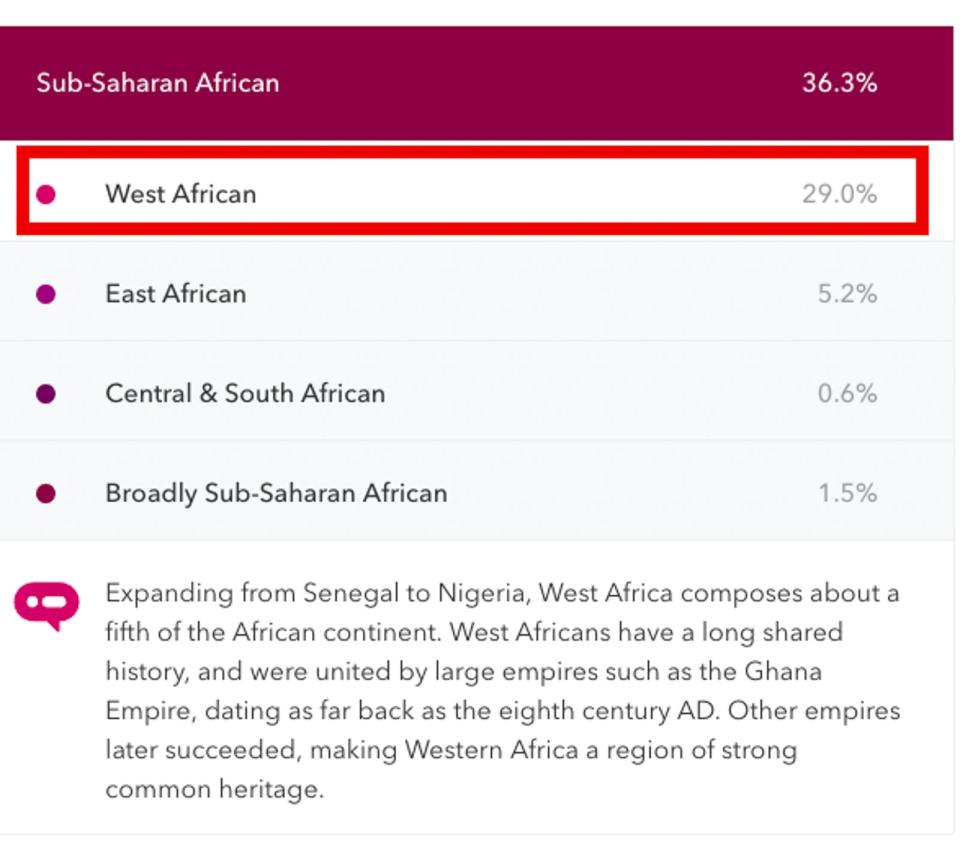
African Americans face additional hurdles. "It's extremely difficult for individuals of African-American ancestry to trace their roots because of the slave trade," said Ancestry's Granka. Family documents for even well-chronicled African-American families typically extend no further than the mid-1800s, the end of the transatlantic slave trade, leaving obvious gaps in the historical record that DNA alone cannot replace.
Companies are well aware of these disparities. Since the initial publication of this guide, 23andMe launched The African Genetics Project to add more customers with detailed knowledge of their African ancestry to their reference database. And in that time AncestryDNA has added additional country-level breakdowns for customers of Asian descent.
Our tester of African descent received broadly similar results on his African heritage from 23andMe, AncestryDNA, FamilyTreeDNA, and National Geographic Geno DNA. All indicated West African roots, which jibes with his known ancestry because his paternal grandfather is from Guinea.
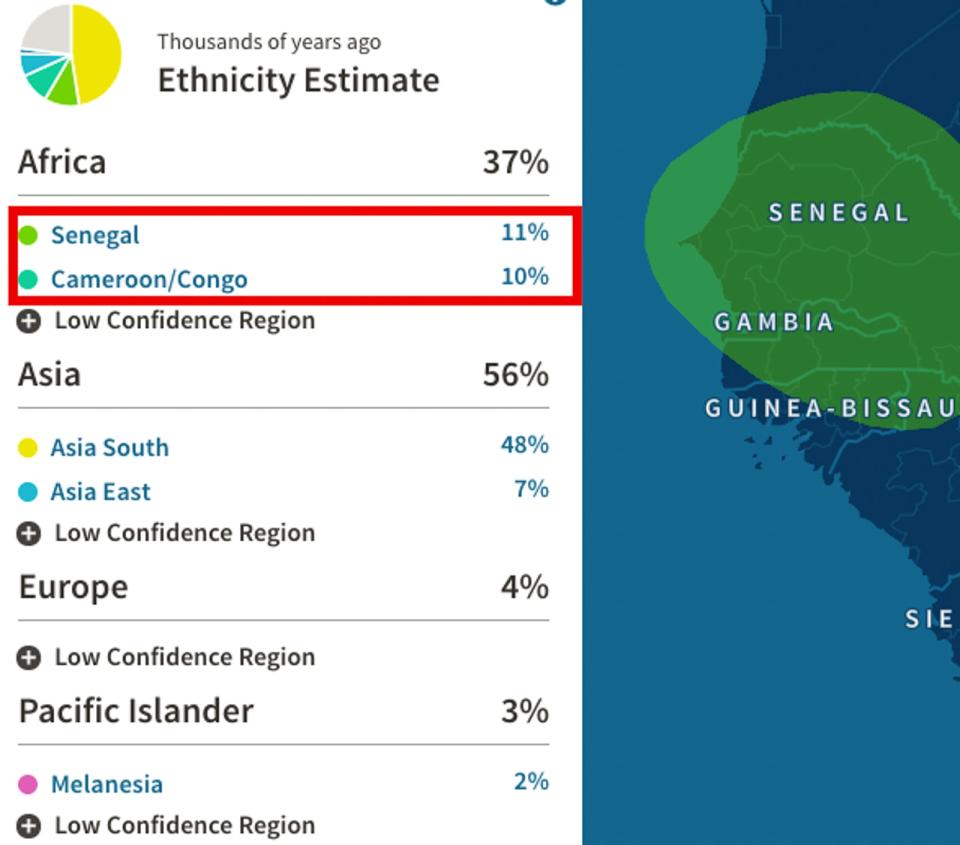
To better understand the role that reference databases play in ethnicity results we also submitted his DNA samples to African Ancestry, a company co-founded by genetic biologist Rick Kittles, who claims to use a reference population database of roughly 35,000 contemporary Africans, a sample more than 50 times the size of that reported by any other service we tested.
The company's Y-DNA analysis was very surprising. African Ancestry found the largest cluster of identical matches to our tester in a population located in modern-day Angola, some 2,500 miles farther south along Africa's western coast than where his documented family history points. In a phone interview conducted after we'd received the test results, Kittles examined the results and expressed full confidence in the Angola findings. Kittles did see a cluster of identical matches in Guinea-Bissau, but those matches occurred with four times less frequency than they did in Angola, leaving Kittles to make a subjective call in the results our tester received.
This situation is not uncommon, according to Kittles. "Sometimes we find identical matches across a broad geographic range," he explained. "We then have to come up with the most likely ancestral homeland [for our customer] ... based on where the matches are most common." Kittles noted that if the matches in Guinea-Bissau occurred at a frequency close to that of Angola, both populations would be listed in the results.
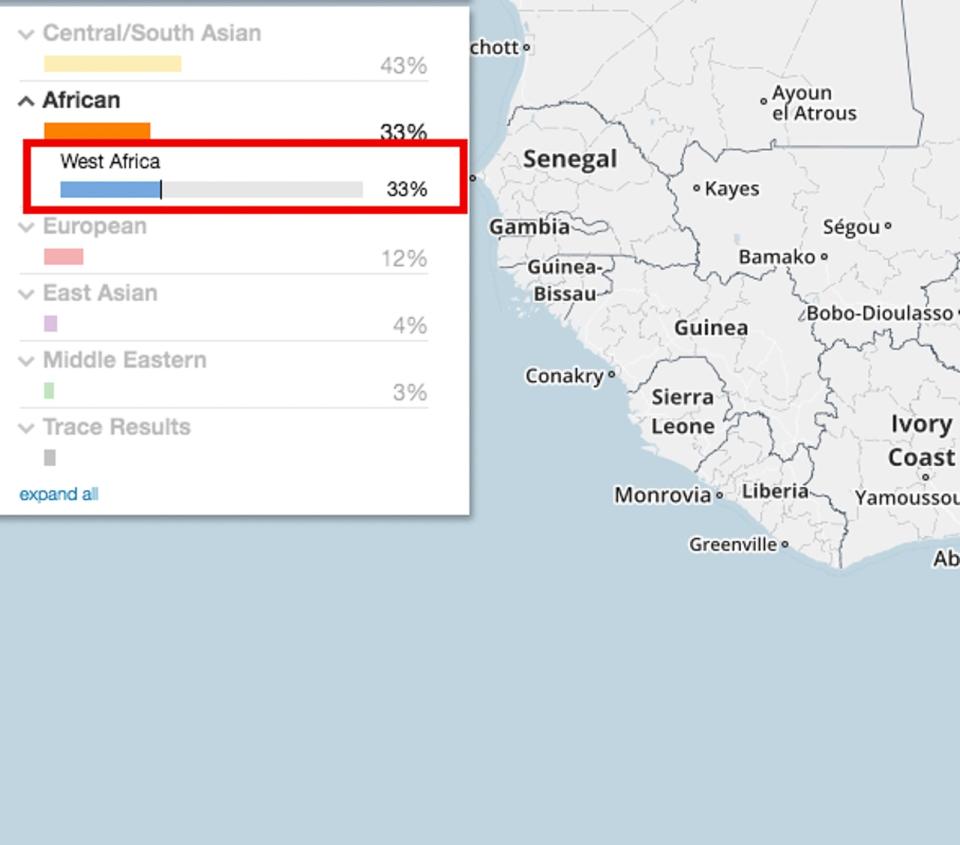
What could explain this surprising addition to our tester's family lineage? One possibility lies in the fact that Angola was a Portuguese colony beginning in the 16th century. Portuguese slave ships would bring their cargo from Angola along the western coast and make a stopover in Cape Verde before heading to Brazil. And Cape Verde lies just off the coast of former slave trading ports in the Senegal/Guinea region of West Africa. DNA testing can't always provide a definitive answer to your ancestral roots, but it can suggest the questions you should ask in search of them.
The experience with African Ancestry neatly summarizes the balance between science and interpretive analysis that all DNA companies are faced with. Large companies may rely on software algorithms to make these judgement calls, but the issue remains the same: The science can tell us only so much about our ancestral histories.
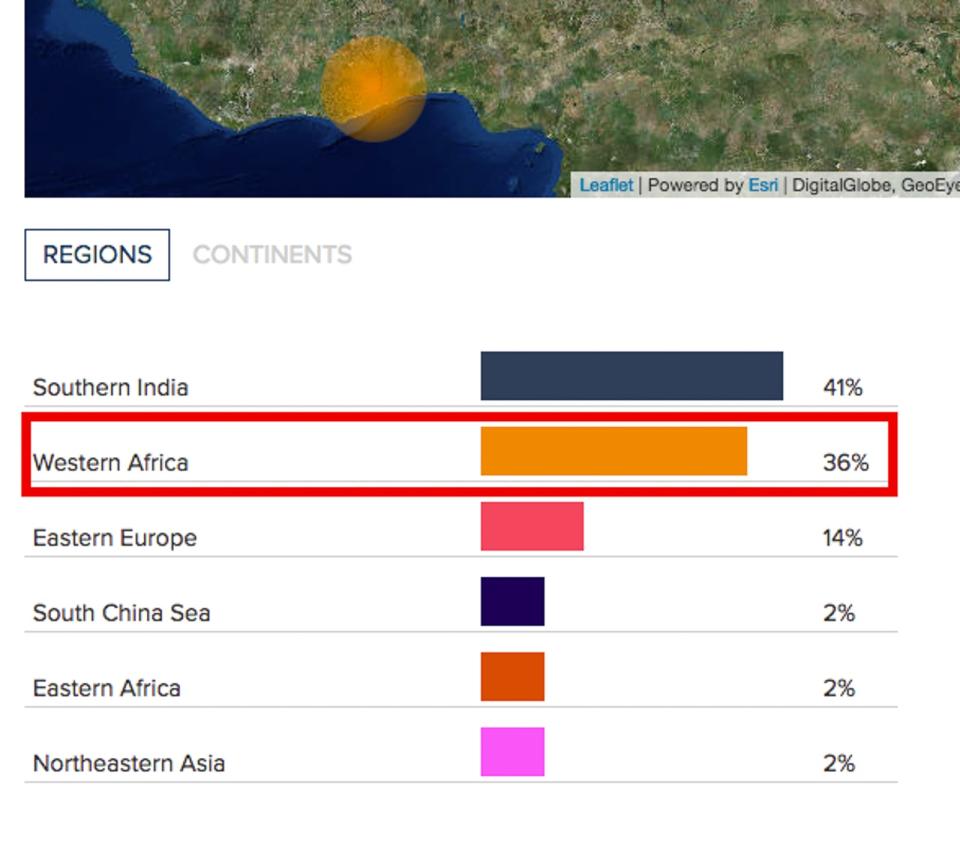
And a closer look at this same tester's results from our main picks revealed broader geographic definitions than were evident at first glance. AncestryDNA shows ties to a Senegal region that encompasses Guinea but also to a Cameroon/Congo region that, on its map, extends from Nigeria all the way down to northern Angola. At FamilyTreeDNA, our tester's West African portion of the company's ethnicity map not so helpfully stretches from Mali all the way down to the tip of South Africa.
The competition
African Ancestry wasn't created to tell you if you have African roots. It has a much more narrow goal: to match a person of African descent with the tribe and present-day country location of their contemporary relatives. Offering tests for either maternal or paternal lineage, the company uses a database of contemporary African DNA that's more than 50 times larger than that of any service we tested. African Ancestry is very conservative in its approach, however, requiring a 98.6 percent or higher genetic match to its reference populations before providing a tribal/country match, resulting in a high number of paternal test results—35 percent, the company said—that come back as European, not African.
The National Geographic Society's nonprofit Geno DNA Project lets you learn about your ancestry while contributing to global research on ancient human migration. Our testers, however, noted that it provided less detail about their more recent ethnic roots than any of the other services we tested. "The National Geographic test seemed a bit underdeveloped. I wished it had been more in depth," remarked one tester. And unlike our main picks, it doesn't have a mechanism by which to discover close relatives.
Living DNA is a UK-based service that launched in the US in 2017. The European Union has been active in regulating tech companies concerning consumer privacy, and Living DNA's promotional materials highlight that it does not sell or share "any of your data." The company declined to provide us with its customer database size but told us that 30 percent of its customers reside in the UK and 55 percent of its customers have British ancestry. Given the disparities that already exist among US companies for customers of non-European descent, people who are not looking to trace ancestry back to the UK are likely better served by AncestryDNA, 23andMe, or FamilyTreeDNA.
Full Genomes is the most expensive service we researched, with test prices starting at $800, more than twice as much as any other competitor.
The DNA Solutions website indicates a primary focus on paternity testing, with ancestry information limited to a "wall chart" showing broad migration patterns of your ancient ancestors.
EasyDNA, which also operates as HomeDNADirect, appears to be an aggregator of a few testing companies. It offers a grab bag of genetic services, including paternity testing and bird sexing (yes, it's a thing).
As of this writing, Dynamic DNA does not offer autosomal testing, so it can give you no information on ethnicity.
MyHeritage has offered DNA tests only since late 2016, which almost certainly means it'll have a relatively small database of DNA test takers from which to generate family matches. Just how small, we don't know. In June 2017 we asked a customer service representative and were told that the size of the company's database was not yet publicly available.
As of this writing, GPS Origins has a relatively small customer database of just 10,000 people with which to compare your samples, while AncestryDNA boasts 10 million customers in its DNA database.
The tests offered by DNA Tribes cannot trace your maternal or parental ancestry independently. Our top pick shares this limitation but has a DNA database that is more than five times the size of DNA Tribes's, for potentially more informative results.
This guide may have been updated by Wirecutter. To see the current recommendation, please go here.
When readers choose to buy Wirecutter's independently chosen editorial picks, Wirecutter and Engadget may earn affiliate commissions.
